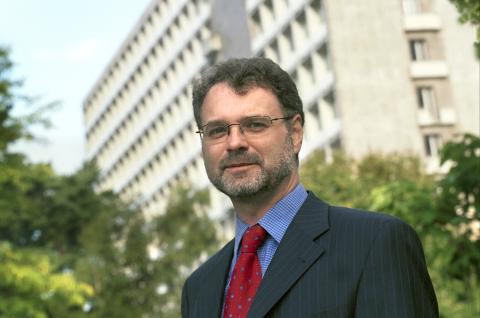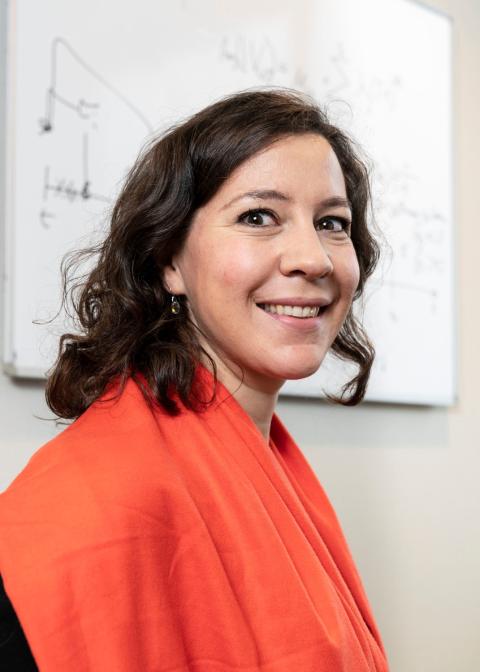How is sustainability woven into education in the Finance Department?
Sustainability is a recurring theme in strategy, research and education at Tilburg University. We asked Jasmin Gider and Luc Rennenboog: how has the Finance Department (TiSEM) embedded this subject in its educational programme? Students in this Department are about to graduate in the Sustainability Track of the MSc in Finance.
“This specialisation allows students to show prospective employers that they have expertise in subjects in which sustainability and the ESG criteria play a role,” explains Jasmin. “The Master’s is relevant both to students interested in corporate finance and those with a passion for asset management, because a sustainable perspective has become essential to both professional fields.”
What are ESG and SDGs?
ESG stands for Environmental, Social and Governance. ESG criteria are becoming increasingly important factors in business life. They allow the sustainability and ethical consequences on people and the environment of a given company investment to be measured. We also use SDGs – Sustainable Development Goals – to work globally towards a better world. The seventeen goals, which were adopted by the United Nations in 2015, are a global call for action to make the world a better place by tackling challenges such as poverty, education, and the climate crisis. The aim is to attain these goals by 2030.
Sustainability: a mainstream research theme
How come this Department has become so active in incorporating sustainability into its educational programme (for instance, first- and second-year students can also follow courses that focus on this topic)? Luc: “Jasmin and I have both been doing research in this area for years. Academic interest in the field has been growing, particularly in the last five years, and it’s now a mainstream research theme.” More and more private businesses are getting involved, too. Jasmin: “For example, during lectures we tell students about the fact that private companies emit carbon dioxide and greenhouse gases and have other kinds of negative effect on the environment, and that their profitability and future existence are threatened by climate change.” So clients and investors are also demanding more sustainable decisions.

The students also learn how to detect when companies are merely ‘greenwashing’, employing sustainability as a marketing tool
Looking critically at academic articles
The two lecturers started the Sustainability Track because they wanted to raise student awareness of climate change. Luc: “Students know from their own experience that the climate is changing. But they will also have to deal with it in their working lives, for instance because of the ESG criteria that many companies have adopted.” Besides awareness-raising, the track focuses on learning appropriate skills. Jasmin: “We train students in the skills they’ll need after completing their studies, such as interpreting scientific research. We teach them how to be well informed, how to read academic papers and to critically evaluate them.” The ESG criteria are closely connected to the seventeen SDGs (see box). Jasmin: “We train students to equip themselves with tools that let them evaluate the business value consequences of attaining, or failing to attain, the sustainable goals laid out in the SDGs. Including the perspective of various stakeholders. They learn to think of ways to achieve these SDGs at the organizational level.”
With courses that place an emphasis on ESG, we’re giving students tools that will allow them to independently evaluate, assess, and implement sustainability goals within the companies they work for – and perhaps also in their own lives. And they’ll learn how to estimate the consequences of reaching these goals, or of failing to reach them, for the value of these companies

The business community works with the sustainability track
Several large companies, including Deloitte, Bundesbank and PricewaterhouseCoopers (PwC), are actively involved in this Master’s track. For one thing it gives them access to students; for another they can provide real-life cases for students to test their skills on. Jasmin: “PwC supplied a case of an international fashion company. The assignment was to identify the most pressing sustainability issues influencing the company, both immediately and in the long term. The students also had to develop a model with which to value this company in a variety of scenarios; one in which the company chose to be a front runner in sustainability, and another in which the company did badly.” The student teams with the three best solutions were invited to present their cases to PwC. Jasmin: “The winning team had used a lot of recent academic data on the ways that risk factors influence operating results. They had used their methodological skills in very creative ways.”
One example of a subject in which students in this track are graduating is the question of the impact of green bonds on a company’s capital costs
Shocking figures
This case also contributed to raising awareness. Luc: “Fast fashion is responsible for 10% of carbon dioxide emissions worldwide. 45% of the plastic microparticles that end up in the oceans come from synthetic fibres loosened during the washing and production of clothing. And every second a large truck-full of clothing is dumped. Every second! These are really shocking figures.” Jasmin: “Part of awareness is being motivated to be well informed about this kind of thing.” Luc: “Which means the students also learn how to detect when companies are merely ‘greenwashing’, employing sustainability as a marketing tool.”
New regulations
Legal frameworks also play a role in the Master’s track. For instance, 2024 will see enforcement of the European Corporate Sustainable Reporting Directive, which will oblige companies with 200 or more employees to report on their environmental footprint, their ESG. Jasmin: “The Corporate Sustainable Due Diligence Directive is also coming up, which will mean that companies will be responsible for everything that happens in their supply chain – including any violation of human rights, or climate regulations, for instance.”
Right now ESG issues are becoming particularly important to the business world, the financial investment industry, and the public sector. And the avalanche of ESG legislation in the pipeline demands a thorough knowledge of how sustainability requirements can affect the value of a business
The impact of green bonds
Tilburg University is making an indirect contribution to the achievement of SDGs by linking practical cases to scientific insights and data. Jasmin: “With courses that place an emphasis on ESG, we’re giving students tools that will allow them to independently evaluate, assess, and implement sustainability goals within the companies they work for – and perhaps also in their own lives. And they’ll learn how to estimate the consequences of reaching these goals, or of failing to reach them, for the value of these companies.” Luc: “One example of a subject in which students in this track are graduating is the question of the impact of green bonds on a company’s capital costs.”
What is altruism worth?
“You can also examine the influence of company donations: what is altruism worth? That falls under the S for Social,” he continues. “Business altruism results in more loyal customers and a better reputation, which have a positive influence on business value.” So the two lecturers are also giving students an ethical perspective on sustainability. Jasmin: “And the G of governance includes themes like inclusivity, gender equality, and the eradication of discrimination. Right now ESG issues are becoming particularly important to the business world, the financial investment industry, and the public sector. And the avalanche of ESG legislation in the pipeline demands a thorough knowledge of how sustainability requirements can affect the value of a business.”
